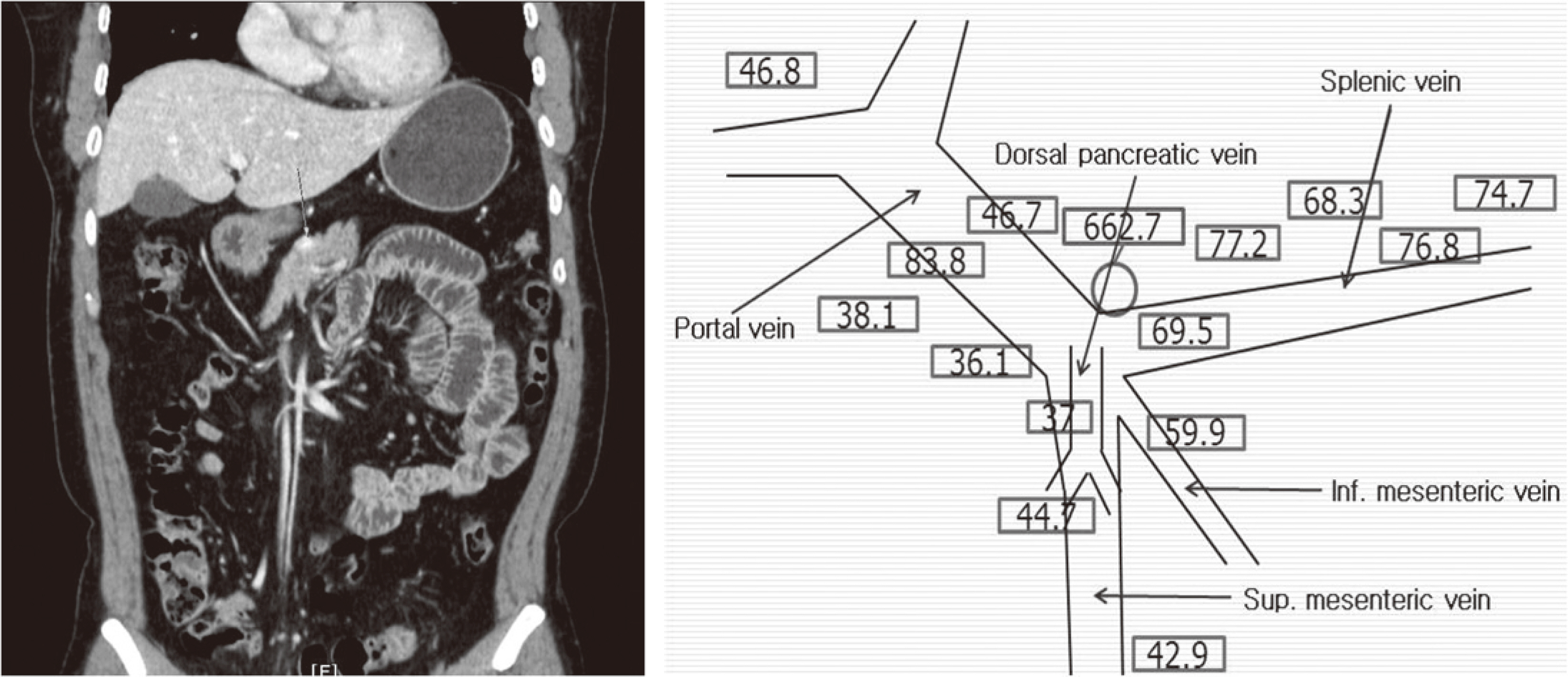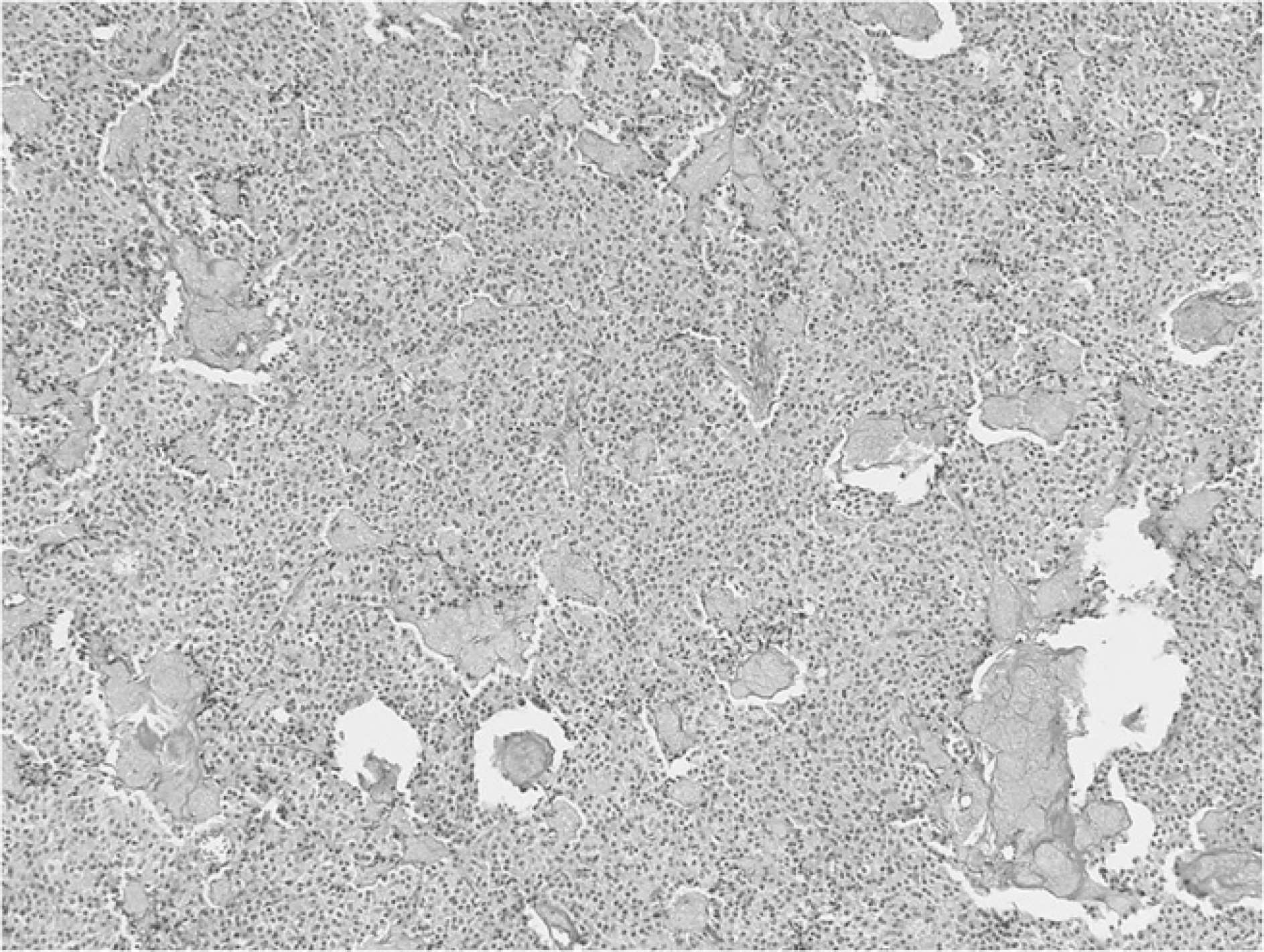J Korean Diabetes.
2013 Jun;14(2):98-101. 10.4093/jkd.2013.14.2.98.
A Case of Insulinoma with Hypoglycemic Encephalopathy
- Affiliations
-
- 1Department of Internal Medicine, Ulsan University Hospital, College of Medicine University of Ulsan, Ulsan, Korea. es10@unitel.co.kr
- 2Department of General Surgery, Ulsan University Hospital, College of Medicine University of Ulsan, Ulsan, Korea.
- 3Department of Pathology, Ulsan University Hospital, College of Medicine University of Ulsan, Ulsan, Korea.
- 4Department of Neurology, Ulsan University Hospital, College of Medicine University of Ulsan, Ulsan, Korea.
- KMID: 1430845
- DOI: http://doi.org/10.4093/jkd.2013.14.2.98
Abstract
- A 47-year-old male with recurrent abnormal behavior for ten years was referred to our clinic. He was diagnosed with insulinoma and cognitive dysfunction. Persistent hypoglycemia leads to a high risk of cognitive dysfunction in diabetic patients. However, cognitive dysfunction associated with insulinoma is rare. In this case study, cognitive dysfunction was confirmed by neurological testing.
Keyword
MeSH Terms
Figure
Reference
-
1. Boukhman MP, Karam JH, Shaver J, Siperstein AE, Duh QY, Clark OH. Insulinoma-experience from 1950 to 1995. West J Med. 1998; 169:98–104.2. Coelho C, Druce MR, Grossman AB. Diagnosis of insulinoma in a patient with hypoglycemia without obvious hyperinsulinemia. Nat Rev Endocrinol. 2009; 5:628–31.
Article3. Vaidakis D, Karoubalis J, Pappa T, Piaditis G, Zografos GN. Pancreatic insulinoma: current issues and trends. Hepatobiliary Pancreat Dis Int. 2010; 9:234–41.4. SFadini GP, Rigato M, Tiengo A, Avogaro A. Characteristics and mortality of type 2 diabetic patients hospitalized for severe iatrogenic hypoglycemia. Diabetes Res Clin Pract. 2009; 84:267–72.5. Malouf R, Brust JC. Hypoglycemia: causes, neurological manifestations, and outcome. Ann Neurol. 1985; 17:421–30.
Article6. Warren RE, Frier BM. Hypoglycaemia and cognitive function. Diabetes Obes Metab. 2005; 7:493–503.
Article7. Witsch J, Neugebauer H, Flechsenhar J, Juttler E. Hypoglycemic encephalopathy: a case series and literature review on outcome determination. J Neurol. 2012.
Article8. Daggett P, Nabarro J. Neurological aspects of insulinomas. Postgrad Med J. 1984; 60:577–81.
Article9. SAuer RN, Siesjo BK. Hypoglycaemia: brain neurochemistry and neuropathology. Baillieres Clin Endocrinol Metab. 1993; 7:611–25.10. Langan SJ, Deary IJ, Hepburn DA, Frier BM. Cumulative cognitive impairment following recurrent severe hypoglycaemia in adult patients with insulin-treated diabetes mellitus. Diabetologia. 1991; 34:337–44.
Article11. Auer R, Kalimo H, Olsson Y, Wieloch T. The dentate gyrus in hypoglycemia: pathology implicating excitotoxin-mediated neuronal necrosis. Acta Neuropathol. 1985; 67:279–88.12. Cosi C, Suzuki H, Milani D, Facci L, Menegazzi M, Vantini G, Kanai Y, Skaper SD. Poly(ADP-ribose) polymerase: early involvement in glutamate-induced neurotoxicity in cultured cerebellar granule cells. J Neurosci Res. 1994; 39:38–46.
Article13. Nellgard B, Wieloch T. Cerebral protection by AMPA-and NMDA-receptor antagonists administered after severe insulin-induced hypoglycemia. Exp Brain Res. 1992; 92:259–66.
Article14. Suh SW, Aoyama K, Chen Y, Garnier P, Matsumori Y, Gum E, Liu J, Swanson RA. Hypoglycemic neuronal death and cognitive impairment are prevented by poly(ADP-ribose) polymerase inhibitors administered after hypoglycemia. J Neurosci. 2003; 23:10681–90.
Article15. Tam EW, Haeusslein LA, Bonifacio SL, Glass HC, Rogers EE, Jeremy RJ, Barkovich AJ, Ferriero DM. Hypoglycemia is associated with increased risk for brain injury and adverse neurodevelopmental outcome in neonates at risk for encephalopathy. J Pediatr. 2012; 161:88–93.
Article
- Full Text Links
- Actions
-
Cited
- CITED
-
- Close
- Share
- Similar articles
-
- A Case of Insulinoma Presenting as Repetitive Abnormal Behavior with Amnesia
- A Case of Insulinoma Associated with Type 2 Diabetes Mellitus
- Rapid Regression of White Matter Changes in Hypoglycemic Encephalopathy
- A Case of Severe Hypoglycemic Encephalopathy with Extensive Brain Lesions in Non-diabetics and Alcoholism
- Anesthesia for an Insulinoma Case



